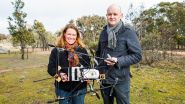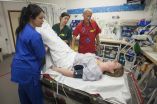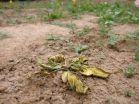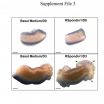(Press-News.org) Many political leaders, scientists, educators and parents believe that failure is the best teacher.
Scientists have long understood that the brain has two ways of learning. One is avoidance learning, which is a punishing, negative experience that trains the brain to avoid repeating mistakes. The other is reward-based learning, a positive, reinforcing experience in which the brain feels rewarded for reaching the right answer.
A new MRI study by USC and a group of international researchers has found that having the opportunity to learn from failure can turn it into a positive experience - if the brain has a chance to learn from its mistakes.
"We show that, in certain circumstances, when we get enough information to contextualize the choices, then our brain essentially reaches towards the reinforcement mechanism, instead of turning toward avoidance," said Giorgio Coricelli, a USC Dornsife associate professor of economics and psychology.
For the study, researchers engaged 28 subjects, each around 26 years old, in a series of questions that challenged them to maximize their gains by providing the right answers. If they chose a wrong answer, they lost money, while right answers helped them earn money.
One trial prompted their brains to respond to getting the wrong answer with avoidance learning. A second trial prompted a reward-based learning reaction, and a third but separate trial tested whether participants had learned from their mistakes, allowing them to review and understand what they got wrong.
In that third round, the participants responded positively, activating areas in their brains that some scientists call the "reward circuit" - or the "ventral striatum." This experience mimicked the brain's reward-based learning response - as opposed to an avoidance-learning response, an experience that involves different parts of the brain that together comprise the "anterior insula."
Coricelli said this process is similar to what the brain experiences when feeling regret: "With regret, for instance, if you have done something wrong, then you might change your behavior in the future," he said.
INFORMATION:
Coricelli conducted the study with scientists from the University College London, the French Institute for Robotics and Intelligent Systems, the French Institute of Health and Medical Research, and the French National Center for Scientific Research. The findings were published on Aug. 25 in the journal Nature Communications.
Since the early days of fertility treatment, women undergoing IVF treatment have had to place a hormonal gel in their vagina on a daily basis for at least 14 days after embryo transfer. The hormone is necessary to increase the chances of pregnancy, but it may also cause some side effects in the form of irritation and leaky discharge.
However, the results of a new scientific study suggest that women will be able to avoid this kind of discomfort in the future.
"Fertility treatment is a physical and mental challenge for childless couples. The daily treatment with hormonal ...
Researchers at The Australian National University (ANU) and The University of Sydney have developed a world-first radio-tracking drone to locate radio-tagged wildlife.
Lead researcher Dr Debbie Saunders from the ANU Fenner School of Environment and Society said the drones have successfully detected tiny radio transmitters weighing as little as one gram. The system has been tested by tracking bettongs at the Mulligan's Flat woodland sanctuary in Canberra.
"The small aerial robot will allow researchers to more rapidly and accurately find tagged wildlife, gain insights into ...
A research team at Linköping University, together with colleagues in Europe and the United States, has shown that at extremely high pressure even the innermost electrons in the atomic nuclei of the metal osmium begin to interact with each other, a phenomenon never witnessed before. The findings have been published in Nature.
"If we know more about how a matter works, we will be in a better position to develop materials that withstand extreme conditions. In research we're constantly making advances, but in this case we've taken a giant leap", says Igor Abrikosov, ...
A new £6.65 million grant for research aimed at accelerating the discovery and application of new advanced materials for the energy sector was announced today by the Engineering and Physical Sciences Research Council (EPSRC).
The grant, awarded to a team led by Professor Matthew Rosseinsky of the University of Liverpool, will support a programme, Integration of Computation and Experiment for Accelerated Materials Discovery.
Professor Rosseinsky will head up an expert team at Liverpool and University College London that will work to tackle the challenge of designing ...
Noroviruses are the predominant cause of gastroenteritis outbreaks in community settings such as hospitals, cruise ships, and schools. The virus is extremely contagious and is mostly transmitted via "fecal-oral-route", i.e., through contaminated hands or contaminated food. Symptoms include violent and sudden onset of diarrhea, vomiting, and nausea.
"It is therefore important to provide a safe and harmless disinfectant against human norovirus," explains Grant Hansman, head of CHS junior research group at the German Cancer Research Center noroviruses and the University ...
A simple, safe and cost-free modification to a physical technique used to treat patients in the emergency department with an abnormally fast heart rhythm could improve its effectiveness by more than a quarter, according to a study published in The Lancet today (25 August 2015).
An abnormally fast heart rhythm, also called supraventricular tachycardia, can be distressing for patients and many come to emergency departments for treatment. Symptoms can include chest pain, light-headedness, dizziness and breathlessness. Episodes can last from a few seconds or, in extreme cases, ...
This news release is available in German. Trillions of bacteria populate the human gut - which makes them more common than any other cells in our body. The composition of this bacterial population is very variable and influenced by our diet. Diseases, but also antibiotic treatments can induce significant shifts in this equilibrium. If entire bacterial groups suddenly multiply heavily, critical situations occur. They damage the intestinal tissue and cause inflammations. How such shifts are triggered largely remained a mystery. Physiologists from the University of Zurich ...
This news release is available in German.
Root bacteria are known to form symbiotic relationships with plants by improving the plants' supply of nutrients. Yet as scientists at the Max Planck Institute for Chemical Ecology in Jena, Germany, found recently, the bacteria actually play a much more profound role. During field experiments in Utah, in the western USA, researchers discovered that the right mixture of soil microbiota directly influences the survival of Nicotiana attenuata, a species of wild tobacco. Plants that had been unable to establish a protective ...
University of Manchester scientists have bridged a gap between two separate pieces of small intestine kept alive outside the body, in an advance which could have implications for surgery in human adults and babies.
It is not currently possible to study the intestine in embryos when inside the body, which holds back advances in treatment for conditions causing damage in infants. However, new techniques used by the researchers in this study have allowed organs to be kept alive and grown on supports which allow the absorption of nutrients.
A video is available here
or ...
In an era where popular culture is increasingly recognized for its impact on lay understanding of health and medicine, few scholars have looked at television's powerful role in the creation of patient expectations, especially regarding pregnancy and birth.
As part of a larger research project funded by a National Science Foundation Dissertation Improvement Grant, Danielle Bessett, University of Cincinnati assistant professor of sociology in the McMicken College of Arts and Sciences examined how women understand their television viewing practices regarding pregnancy and ...



